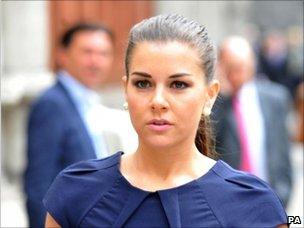Sunday Herald names footballer accused on Twitter
- Published

Former reality TV star Imogen Thomas is facing legal action from "CTB"
A Scottish newspaper has named a footballer accused of being linked to a privacy injunction by users of social networking website Twitter.
The Sunday Herald is the first mainstream UK publication to do this.
Its front page has an image of a man whose eyes are covered with a black bar which features the word "censored".
It comes after Twitter users reacted to a footballer's attempt to find out who is putting information about him on the website by posting new messages online.
The player, who an injunction says can only be identified as CTB, is involved in proceedings against former Miss Wales and ex-Big Brother star Imogen Thomas and the Sun newspaper.
'Unsustainable'
In recent weeks there has been heightened scrutiny of gagging orders such as injunctions and so-called super-injunctions - court orders that prevent the media from revealing even the fact that an injunction has been granted.
In its editorial explaining the move, the Sunday Herald said it named the sportsman being linked to the injunction on Twitter because it was "unsustainable" for newspapers to be prevented from sharing information which is easily available on the internet.
It said: "We should point out immediately that we are not accusing the footballer concerned of any misdeed. Whether the allegations against him are true or not has no relevance to this debate.
"The issue is one of freedom of information and of a growing argument in favour of more restrictive privacy laws."
Richard Walker, editor of the Sunday Herald, said: "It seems to us a ludicrous situation where we are supposed to keep from our readers the identity of someone who anybody can find out on the internet at the click of a mouse, and in fact many people have already done so."
He added that he had taken extensive legal advice and was not expecting any legal consequences because the injunction was not valid in Scotland - only in England.
His paper, he said, was not published, distributed or sold in England.
The newspaper's website is not carrying the name of the footballer or the picture used on the front page of its printed newspaper.
Paul McBride, the paper's legal adviser, said: "Every child in the country with a mobile phone can now access Twitter or the internet and find out who this individual is, and the idea that the media cannot report it is frankly absurd."
Asked whether the front page would increase newspaper sales, he said the decision to publish was "not taken on commercial grounds but on grounds of principle".
"We have the right of freedom of expression and the right to debate these issues. I think the publication in today's paper will bring the matter to a head."
'Out of control'
Media lawyer Mark Stephens said the floodgates had been opened by the naming of the footballer in Spain, Mauritius, and now Scotland.
"It's an exercise in futility to try and continue with this injunction," he said.
If judges did not want to make the law "look an ass" then the injunction had to be recalled and the player named, he added.
Meanwhile, there has been widespread speculation on social media websites in recent days naming high-profile individuals who have allegedly used the English courts to protect their identities.
On Sunday it emerged that the attorney general is being asked to consider prosecuting a journalist who allegedly broke a privacy order on Twitter.
The unnamed writer allegedly named a footballer, who is accused of having an affair, known in court papers as TSE.
The attorney general's office said it would "consider the matter carefully" but had not yet received the request.
On Friday, the findings of a year-long inquiry by a committee of judges and lawyers into the use of injunctions and so-called super-injunctions were revealed.
The committee's report, external said super-injunctions were now being granted for "short periods" and only where "secrecy is necessary".
Committee chairman Lord Neuberger, who is the most senior civil judge in England and Wales, said the internet "does add to difficulties of enforcement at the moment".
He said the internet had "by no means the same degree of intrusion into privacy as the story being emblazoned on the front pages of newspapers", which "people trust more".
However, he warned that modern technology was "totally out of control" and society should consider other ways to bring Twitter and other websites under control.
- Published21 May 2011
- Published22 May 2011
- Published21 May 2011